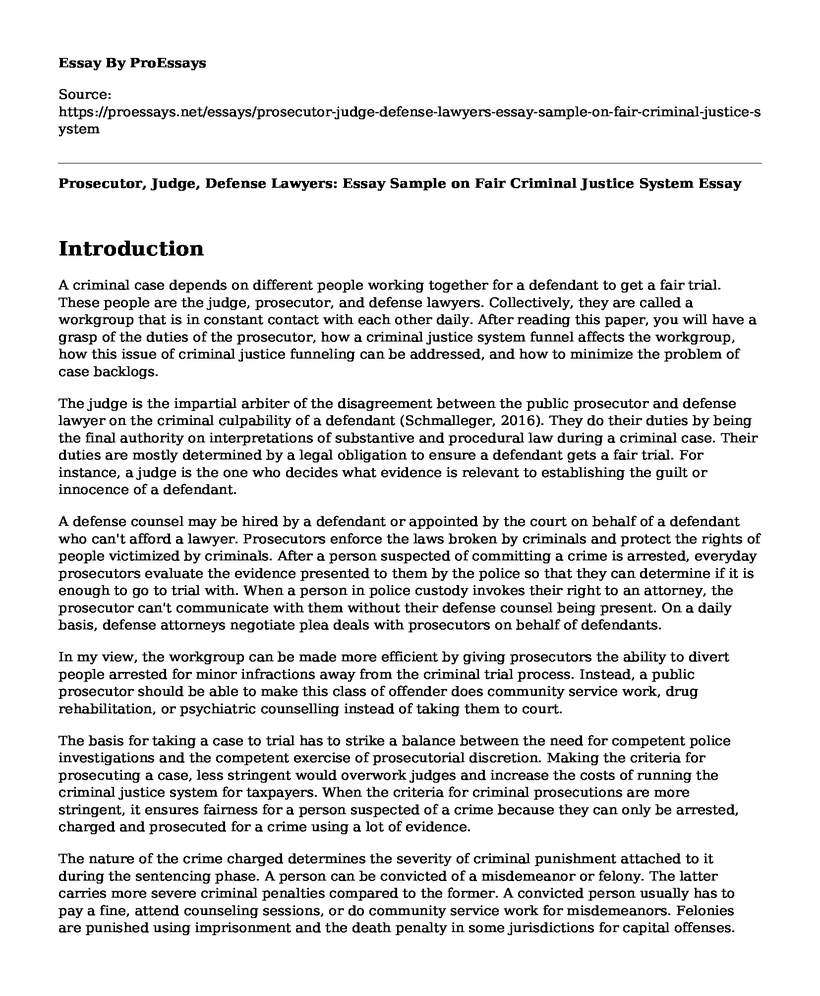Introduction
A criminal case depends on different people working together for a defendant to get a fair trial. These people are the judge, prosecutor, and defense lawyers. Collectively, they are called a workgroup that is in constant contact with each other daily. After reading this paper, you will have a grasp of the duties of the prosecutor, how a criminal justice system funnel affects the workgroup, how this issue of criminal justice funneling can be addressed, and how to minimize the problem of case backlogs.
The judge is the impartial arbiter of the disagreement between the public prosecutor and defense lawyer on the criminal culpability of a defendant (Schmalleger, 2016). They do their duties by being the final authority on interpretations of substantive and procedural law during a criminal case. Their duties are mostly determined by a legal obligation to ensure a defendant gets a fair trial. For instance, a judge is the one who decides what evidence is relevant to establishing the guilt or innocence of a defendant.
A defense counsel may be hired by a defendant or appointed by the court on behalf of a defendant who can't afford a lawyer. Prosecutors enforce the laws broken by criminals and protect the rights of people victimized by criminals. After a person suspected of committing a crime is arrested, everyday prosecutors evaluate the evidence presented to them by the police so that they can determine if it is enough to go to trial with. When a person in police custody invokes their right to an attorney, the prosecutor can't communicate with them without their defense counsel being present. On a daily basis, defense attorneys negotiate plea deals with prosecutors on behalf of defendants.
In my view, the workgroup can be made more efficient by giving prosecutors the ability to divert people arrested for minor infractions away from the criminal trial process. Instead, a public prosecutor should be able to make this class of offender does community service work, drug rehabilitation, or psychiatric counselling instead of taking them to court.
The basis for taking a case to trial has to strike a balance between the need for competent police investigations and the competent exercise of prosecutorial discretion. Making the criteria for prosecuting a case, less stringent would overwork judges and increase the costs of running the criminal justice system for taxpayers. When the criteria for criminal prosecutions are more stringent, it ensures fairness for a person suspected of a crime because they can only be arrested, charged and prosecuted for a crime using a lot of evidence.
The nature of the crime charged determines the severity of criminal punishment attached to it during the sentencing phase. A person can be convicted of a misdemeanor or felony. The latter carries more severe criminal penalties compared to the former. A convicted person usually has to pay a fine, attend counseling sessions, or do community service work for misdemeanors. Felonies are punished using imprisonment and the death penalty in some jurisdictions for capital offenses.
Judges are forced to engage in assembly-line justice when courts have the problem of delays caused by a huge backlog of criminal cases. The funnel effect which follows involves judges not having the ability to give enough time to each defendant before the court to plead their innocence. A solution may lie in decriminalizing the possession of small amounts of narcotic drugs for recreational use (e.g., Marijuana.e.t.c.) can help in this regard (Graham, 2001).
Conclusions
The presiding judge, courtroom staff, public prosecutor(s), and the defendant's lawyer(s) are collectively referred to as the workgroup. They work together to ensure a defendant gets a fair trial on a daily basis. Their work can be made easier by giving prosecutors the power to divert minor offenders away from the criminal trial process. The prosecutor has the duty of enforcing criminal law on behalf of the government while at the same time protecting victim rights. The defense counsel has the job of representing a defendant. Judges regulate the criminal trial process by applying the law. The severity of criminal punishment is determined by the nature of the crimes a defendant is charged and convicted of. The funnel effect occurs when courts are flooded with a lot of cases. One solution to this problem may lie in decriminalizing the possession of small amounts of narcotics for recreational use.
References
Graham, D. (2001). Decriminalization of Marijuana: An Analysis of the Laws in the United States and the Netherlands and Suggested for Reform. Loy. LA Int'l & Comp. L. Rev., 23, 297. Retrieved from https://digitalcommons.lmu.edu/cgi/viewcontent.cgi?article=1524&context=ilr
Schmalleger, F. (2015). Criminal justice today: An introductory text for the 21st century (13th edition). Upper Saddle River (NJ): Pearson-Prentice Hall.
Cite this page
Prosecutor, Judge, Defense Lawyers: Essay Sample on Fair Criminal Justice System. (2023, Mar 28). Retrieved from https://proessays.net/essays/prosecutor-judge-defense-lawyers-essay-sample-on-fair-criminal-justice-system
If you are the original author of this essay and no longer wish to have it published on the ProEssays website, please click below to request its removal:
- Ways in Which the Green Valley Developed Into a Community Essay
- Research Paper on Body-Worn Program Implementation
- How Cyber Laws Affect Us and How Up-to-Date They Are? - Paper Example
- Paper Example on Nancy Seaman Self-Defense Case
- Master's in Crime Scene Investigation Essay
- Essay Example on Youth Crime: Serving Jail Time Twice in Texas
- Vernon Madison: Sentenced to Death Despite Diminished Mental Capacity - Essay Sample







